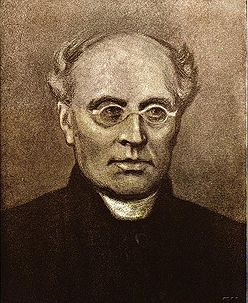Johan Ludwig Runeberg
| Johan Ludvig Runeberg | |
|---|---|

Johan Ludvig Runeberg (portrait by C. P. Mazer)
|
|
| Born |
5 February 1804 Jakobstad, Kingdom of Sweden |
| Died | 6 May 1877 (aged 73) Porvoo, Grand Duchy of Finland, Russian Empire |
| Spouse(s) | Fredrika Runeberg |
| Signature | |
Johan Ludvig Runeberg (Swedish: [ˈjuːhan ˈlʊdvɪɡ ˈrʉːnəbærj]; 5 February 1804 – 6 May 1877) was a Finno-Swedish lyric and epic poet. He is the national poet of Finland and the author of the lyrics to Vårt land (Our Land, Maamme in Finnish) that became the Finnish National Anthem. Runeberg was also involved in the modernization of the Finnish Lutheran hymnal and produced many texts for the new edition.
Runeberg was born into a Swedish-speaking family in Jakobstad, on the shores of the Gulf of Bothnia. At the age of eight, Runeberg was sent to live with his uncle and attend school in Oulu. Runeberg studied in the city of Vaasa, later on at the Imperial Academy of Turku, where he befriended Johan Vilhelm Snellman and Zacharias Topelius. His studies concentrated mainly on the classical languages of Latin and Greek. He earned a Master of Philosophy during 1827. He served as a tutor (1822-1826), docent at the Imperial Alexander University (1830) and teacher at the Swedish-language Helsingfors Lyceum (1831-1836). From 1837 he lived in Porvoo, where he served as professor of Latin literature in the Gymnasium of Porvoo. Finnish salon hostess Natalia Castrén (1830-1881) was a member of his cultural circle.
Many of his poems deal with life in rural Finland. The best known of these is Bonden Paavo, (Farmer Paavo, Saarijärven Paavo in Finnish), about a smallholding peasant farmer in the poor parish of Saarijärvi and his determination, "sisu" (guts) and unwavering faith in providence in the face of a harsh climate and years of bad harvests. Three times, a frosty night destroys his crops. Every time, he mixes double the amount of bark into his bark bread to stave off starvation and works ever harder to dry off marsh into dryer land that would not be as exposed to the night frost. After the fourth year, Paavo finally gets a rich crop. As his wife exults, thanks God and tells Paavo to enjoy full bread made entirely out of grain, Paavo instructs his wife to mix bark into grain once more, because their neighbour's crop has been lost in a frost and he gives half of his crop to the needy neighbour.
...
Wikipedia
